Editor’s Note: The following comprises the third chapter of The Holy Roman Empire, by James Bryce (published 1871). All spelling in the original.
(Continued from Part 2)
CHAPTER III
THE BARBARIAN INVASIONS
The Barbarians
Upon a world so constituted did the barbarians of the North descend. From the dawn of history they shew as a dim background to the warmth and light of the Mediterranean coast, changing little while kingdoms rise and fall in the South: only thought on when some hungry swarm comes down to pillage or to settle. It is always as foes that they are known. The Romans never forgot the invasion of Brennus; and their fears, renewed by the irruption of the Cimbri and Teutones, could not let them rest till the extension of the frontier to the Rhine and the Danube removed Italy from immediate danger. A little more perseverance under Tiberius, or again under Hadrian, would probably have reduced all Germany as far as the Baltic and the Oder. But the politic or jealous advice of Augustus was followed, and it was only along the frontiers that Roman arts and culture affected the Teutonic races. Commerce was brisk; Roman envoys penetrated the forests to the courts of rude chieftains; adventurous barbarians entered the provinces, sometimes to admire, oftener, like the brother of Arminius, to take service under the Roman flag, and rise to a distinction in the legion which some feud denied them at home.
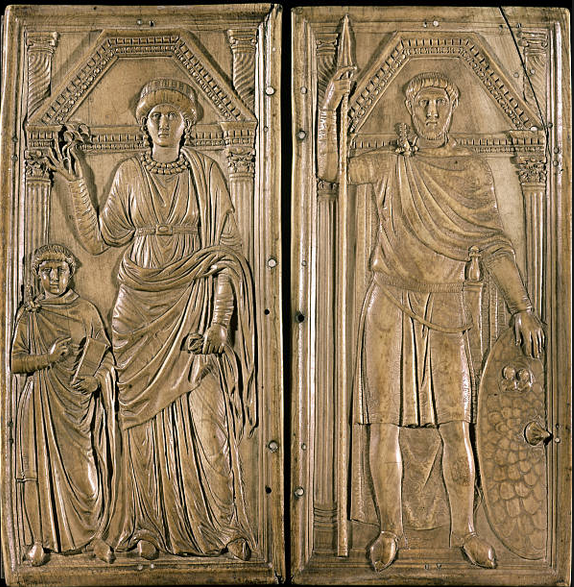
Admitted to Roman titles and honours
This was found even more convenient by the hirer than by the employed; till by degrees barbarian mercenaries came to form the largest, or at least the most effective, part of the Roman armies. The body-guard of Augustus had been so composed; the prætorians were generally selected from the bravest frontier troops, most of them German; the practice could not but increase with the extinction of the free peasantry, the growth of villenage, and the effeminacy of all classes. Emperors who were, like Maximin, themselves foreigners, encouraged a system by whose means they had risen, and whose advantages they knew. After Constantine, the barbarians form the majority of the troops; after Theodosius, a Roman is the exception. The soldiers of the Eastern Empire in the time of Arcadius are almost all Goths, vast bodies of whom had been settled in the provinces; while in the West, Stilicho can oppose Rhodogast only by summoning the German auxiliaries from the frontiers. Along with this practice there had grown up another, which did still more to make the barbarians feel themselves members of the Roman state. Whatever the pride of the old republic might assert, the maxim of the Empire had always been that birth and race should exclude no subject from any post which his abilities deserved. This principle, which had removed all obstacles from the path of the Spaniard Trajan, the Pannonian Maximin, the Numidian Philip, was afterwards extended to the conferring of honour and power on persons who did not even profess to have passed through the grades of Roman service, but remained leaders of their own tribes. Ariovistus had been soothed by the title of Friend of the Roman People; in the third century the insignia of the consulship were conferred on a Herulian chief: Crocus and his Alemanni entered as an independent body into the service of Rome; along the Rhine whole tribes received, under the name of Laeti, lands within the provinces on condition of military service; and the foreign aid which the Sarmatian had proffered to Vespasian against his rival, and Marcus Aurelius had indignantly rejected in the war with Cassius, became the usual, at last the sole support of the Empire, in civil as well as in external strife.
Thus in many ways was the old antagonism broken down—Romans admitting barbarians to rank and office, barbarians catching something of the manners and culture of their neighbours. And thus when the final movement came, and the Teutonic tribes slowly established themselves through the provinces, they entered not as savage strangers, but as colonists knowing something of the system into which they came, and not unwilling to be considered its members; despising the degenerate provincials who struck no blow in their own defence, but full of respect for the majestic power which had for so many centuries confronted and instructed them.
Their feelings towards the Roman Empire
Great during all these ages, but greatest when they were actually traversing and settling in the Empire, must have been the impression which its elaborate machinery of government and mature civilization made upon the minds of the Northern invaders. With arms whose fabrication they had learned from their foes, these dwellers in the forest conquered well-tilled fields, and entered towns whose busy workshops, marts stored with the productions of distant countries, and palaces rich in monuments of art, equally roused their wonder. To the beauty of statuary or painting they might often be blind, but the rudest mind must have been awed by the massive piles with which vanity or devotion, or the passion for amusement, had adorned Milan and Verona, Arles, Treves, and Bordeaux. A deeper awe would strike them as they gazed on the crowding worshippers and stately ceremonial of Christianity, most unlike their own rude sacrifices. The exclamation of the Goth Athanaric, when led into the market-place of Constantinople, may stand for the feelings of his nation: ‘Without doubt the Emperor is a God upon earth, and he who attacks him is guilty of his own blood.’
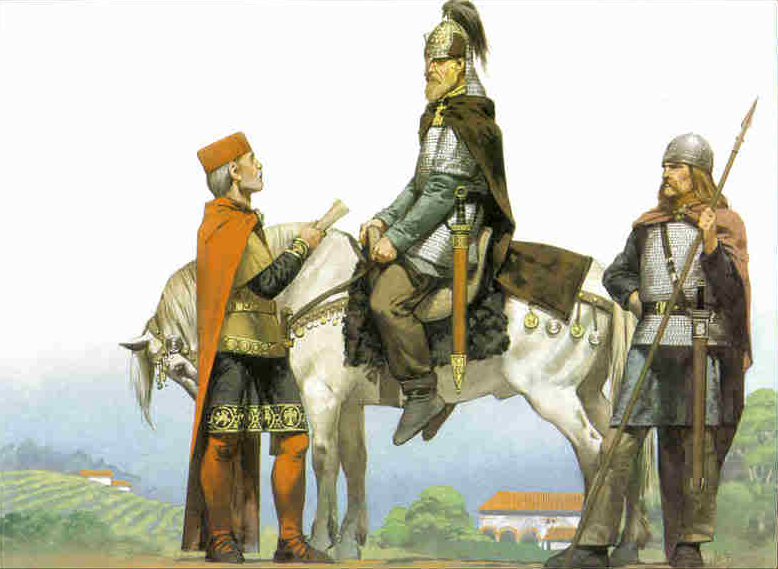
Their desire to preserve its institutions
The social and political system, with its cultivated language and literature, into which they came, would impress fewer of the conquerors, but by those few would be admired beyond all else. Its regular organization supplied what they most needed and could least construct for themselves, and hence it was that the greatest among them were the most desirous to preserve it. The Mongol Attila excepted, there is among these terrible hosts no destroyer; the wish of each leader is to maintain the existing order, to spare life, to respect every work of skill and labour, above all to perpetuate the methods of Roman administration, and rule the people as the deputy or successor of their Emperor. Titles conferred by him were the highest honours they knew: they were also the only means of acquiring something like a legal claim to the obedience of the subject, and of turning a patriarchal or military chieftainship into the regular sway of an hereditary monarch. Civilis had long since endeavoured to govern his Batavians as a Roman general. Alaric became master-general of the armies of Illyricum. Clovis exulted in the consulship; his son Theodebert received Provence, the conquest of his own battle-axe, as the gift of Justinian. Sigismund the Burgundian king, created count and patrician by the Emperor Anastasius, professed the deepest gratitude and the firmest faith to that Eastern court which was absolutely powerless to help or to hurt him. ‘My people is yours,’ he writes, ‘and to rule them delights me less than to serve you; the hereditary devotion of my race to Rome has made us account those the highest honours which your military titles convey; we have always preferred what an Emperor gave to all that our ancestors could bequeath. In ruling our nation we hold ourselves but your lieutenants: you, whose divinely-appointed sway no barrier bounds, whose blessed beams shine from the Bosphorus into distant Gaul, employ us to administer the remoter regions of your Empire: your world is our fatherland.’ A contemporary historian has recorded the remarkable disclosure of his own thoughts and purposes, made by one of the ablest of the barbarian chieftains, Athaulf the Visigoth, the brother-in-law and successor of Alaric. ‘It was at first my wish to destroy the Roman name, and erect in its place a Gothic empire, taking to myself the place and the powers of Cæsar Augustus. But when experience taught me that the untameable barbarism of the Goths would not suffer them to live beneath the sway of law, and that the abolition of the institutions on which the state rested would involve the ruin of the state itself, I chose the glory of renewing and maintaining by Gothic strength the fame of Rome, desiring to go down to posterity as the restorer of that Roman power which it was beyond my power to replace. Wherefore I avoid war and strive for peace.’
Historians have remarked how valuable must have been the skill of Roman officials to princes who from leaders of tribes were become rulers of wide lands; and in particular how indispensable the aid of the Christian bishops, the intellectual aristocracy of their new subjects, whose advice could alone guide their policy and conciliate the vanquished. Not only is this true; it is but a small part of the truth; one form of that manifold and overpowering influence which the old system exercised over its foes not less than its own children. For it is hardly too much to say that the thought of antagonism to the Empire and the wish to extinguish it never crossed the mind of the barbarians. The conception of that Empire was too universal, too august, too enduring. It was everywhere around them, and they could remember no time when it had not been so. It had no association of people or place whose fall could seem to involve that of the whole fabric; it had that connection with the Christian Church which made it all-embracing and venerable.
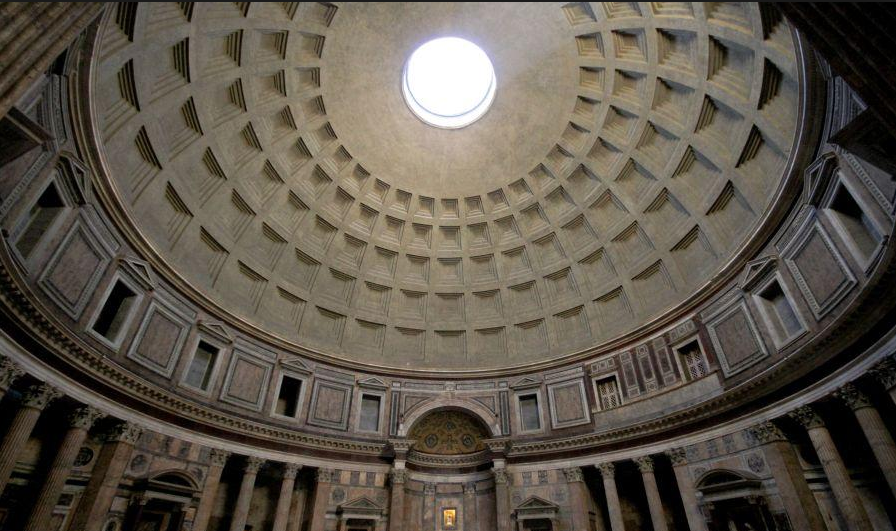
The belief in its eternity
There were especially two ideas whereon it rested, and from which it obtained a peculiar strength and a peculiar direction. The one was the belief that as the dominion of Rome was universal, so must it be eternal. Nothing like it had been seen before. The empire of Alexander had lasted a short lifetime; and within its wide compass were included many arid wastes, and many tracts where none but the roving savage had ever set foot. That of the Italian city had for fourteen generations embraced all the most wealthy and populous regions of the civilized world, and had laid the foundations of its power so deep that they seemed destined to last for ever. If Rome moved slowly for a time, her foot was always planted firmly: the ease and swiftness of her later conquests proved the solidity of the earlier; and to her, more justly than to his own city, might the boast of the Athenian historian be applied: that she advanced farthest in prosperity, and in adversity drew back the least. From the end of the republican period her poets, her orators, her jurists, ceased not to repeat the claim of world-dominion, and confidently predict its eternity. The proud belief of his countrymen which Virgil had expressed—
‘His ego nec metas rerum, nec tempora pono:
Imperium sine fine dedi’—
was shared by the early Christians when they prayed for the persecuting power whose fall would bring Antichrist upon earth. Lactantius writes: ‘When Rome the head of the world shall have fallen, who can doubt that the end is come of human things, aye, of the earth itself. She, she alone is the state by which all things are upheld even until now; wherefore let us make prayers and supplications to the God of heaven, if indeed his decrees and his purposes can be delayed, that that hateful tyrant come not sooner than we look for, he for whom are reserved fearful deeds, who shall pluck out that eye in whose extinction the world itself shall perish.’ With the triumph of Christianity this belief had found a new basis. For as the Empire had decayed, the Church had grown stronger; and now while the one, trembling at the approach of the destroyer, saw province after province torn away, the other, rising in stately youth, prepared to fill her place and govern in her name, and in doing so, to adopt and sanctify and propagate anew the notion of a universal and unending state.
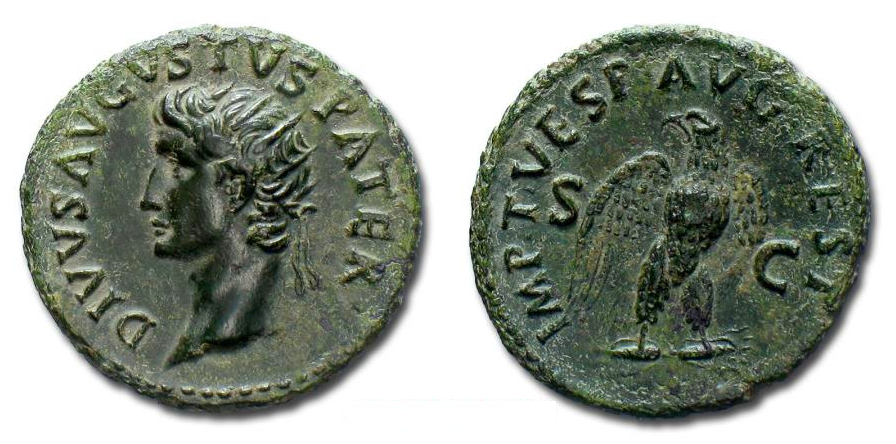
Sanctity of the imperial name
The second chief element in this conception was the association of such a state with one irresponsible governor, the Emperor. The hatred to the name of King, which their earliest political struggles had left in the Romans, by obliging their ruler to take a new and strange title, marked him off from all the other sovereigns of the world. To the provincials especially he became an awful impersonation of the great machine of government which moved above and around them. It was not merely that he was, like a modern king, the centre of power and the dispenser of honour: his pre-eminence, broken by no comparison with other princes, by the ascending ranks of no aristocracy, had in it something almost supernatural. The right of legislation had become vested in him alone: the decrees of the people, and resolutions of the senate, and edicts of the magistrates were, during the last three centuries, replaced by imperial constitutions; his domestic council, the consistory, was the supreme court of appeal; his interposition, like that of some terrestrial Providence, was invoked, and legally provided so to be, to reverse or overleap the ordinary rules of law. From the time of Julius and Augustus his person had been hallowed by the office of chief pontiff and the tribunician power; to swear by his head was considered the most solemn of all oaths; his effigy was sacred, even on a coin; to him or to his Genius temples were erected and divine honours paid while he lived; and when, as it was expressed, he ceased to be among men, the title of Divus was accorded to him, after a solemn consecration. In the confused multiplicity of mythologies, the worship of the Emperor was the only worship common to the whole Roman world, and was therefore that usually proposed as a test to the Christians on their trial. Under the new religion the form of adoration vanished, the sentiment of reverence remained: the right to control Church as well as State, admitted at Nicæa, and habitually exercised by the sovereigns of Constantinople, made the Emperor hardly less essential to the new conception of a world-wide Christian monarchy than he had been to the military despotism of old. These considerations explain why the men of the fifth century, clinging to preconceived ideas, refused to believe in that dissolution of the Empire which they saw with their own eyes. Because it could not die, it lived. And there was in the slowness of the change and its external aspect, as well as in the fortunes of the capital, something to favour the illusion. The Roman name was shared by every subject; the Roman city was no longer the seat of government, nor did her capture extinguish the imperial power, for the maxim was now accepted, Where the Emperor is, there is Rome. But her continued existence, not permanently occupied by any conqueror, striking the nations with an awe which the history or the external splendours of Constantinople, Milan, or Ravenna could nowise inspire, was an ever new assertion of the endurance of the Roman race and dominion. Dishonoured and defenceless, the spell of her name was still strong enough to arrest the conqueror in the moment of triumph. The irresistible impulse that drew Alaric was one of glory or revenge, not of destruction: the Hun turned back from Aquileia with a vague fear upon him: the Ostrogoth adorned and protected his splendid prize.
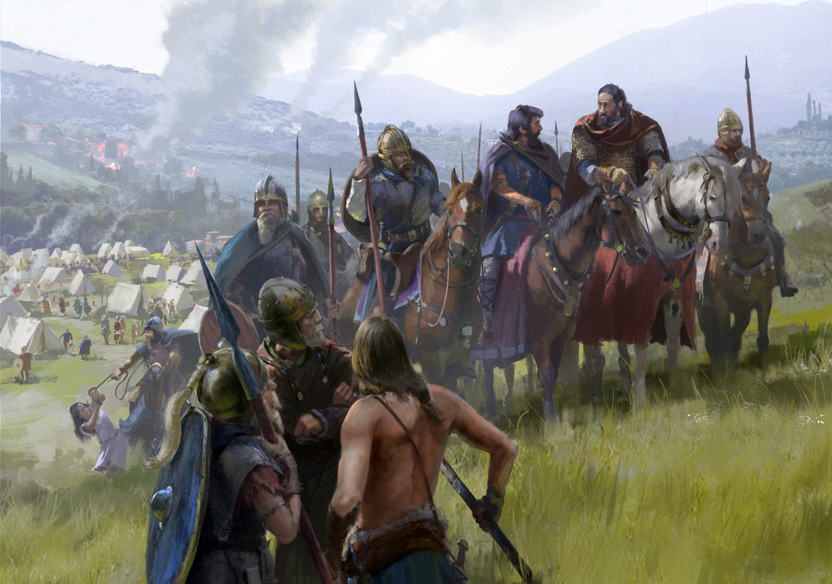
Last days of the Western Empire
In the history of the last days of the Western Empire, two points deserve special remark: its continued union with the Eastern branch, and the way in which its ideal dignity was respected while its representatives were despised. After Stilicho’s death, and Alaric’s invasion, its fall was a question of time. While one by one the provinces were abandoned by the central government, left either to be occupied by invading tribes or to maintain a precarious independence, like Britain and Armorica, by means of municipal unions, Italy lay at the mercy of the barbarian auxiliaries and was governed by their leaders. The degenerate line of Theodosius might have seemed to reign by hereditary right, but after their extinction in Valentinian III each phantom Emperor—Maximus, Avitus, Majorian, Anthemius, Olybrius—received the purple from the haughty Ricimer, general of the troops, only to be stripped of it when he presumed to forget his dependence. Though the division between Arcadius and Honorius had definitely severed the two realms for administrative purposes, they were still supposed to constitute a single Empire, and the rulers of the East interfered more than once to raise to the Western throne princes they could not protect upon it. Ricimer’s insolence quailed before the shadowy grandeur of the imperial title: his ambition, and Gundobald his successor’s, were bounded by the name of patrician. The bolder genius of Odoacer, general of the barbarian auxiliaries, resolved to abolish an empty pageant, and extinguish the title and office of Emperor of the West. Yet over him too the spell had power; and as the Gaulish warrior had gazed on the silent majesty of the senate in a deserted city, so the Herulian revered the power before which the world had bowed, and though there was no force to check or to affright him, shrank from grasping in his own barbarian hand the sceptre of the Cæsars.
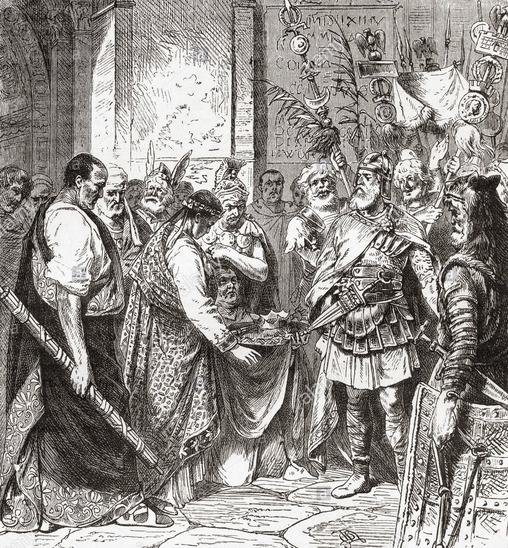
Its extinction by Odoacer, A.D. 476
When, at Odoacer’s bidding, Romulus Augustulus, the boy whom a whim of fate had chosen to be the last native Cæsar of Rome, had formally announced his resignation to the senate, a deputation from that body proceeded to the Eastern court to lay the insignia of royalty at the feet of the Eastern Emperor Zeno. The West, they declared, no longer required an Emperor of its own; one monarch sufficed for the world; Odoacer was qualified by his wisdom and courage to be the protector of their state, and upon him Zeno was entreated to confer the title of patrician and the administration of the Italian provinces. The Emperor granted what he could not refuse, and Odoacer, taking the title of King, continued the consular office, respected the civil and ecclesiastical institutions of his subjects, and ruled for fourteen years as the nominal vicar of the Eastern Emperor. There was thus legally no extinction of the Western Empire at all, but only a reunion of East and West. In form, and to some extent also in the belief of men, things now reverted to their state during the first two centuries of the Empire, save that Byzantium instead of Rome was the centre of the civil government. The joint tenancy which had been conceived by Diocletian, carried further by Constantine, renewed under Valentinian I and again at the death of Theodosius, had come to an end; once more did a single Emperor sway the sceptre of the world, and head an undivided Catholic Church. To those who lived at the time, this year (476 A.D.) was no such epoch as it has since become, nor was any impression made on men’s minds commensurate with the real significance of the event. For though it did not destroy the Empire in idea, nor wholly even in fact, its consequences were from the first great. It hastened the development of a Latin as opposed to Greek and Oriental forms of Christianity: it emancipated the Popes: it gave a new character to the projects and government of the Teutonic rulers of the West. But the importance of remembering its formal aspect to those who witnessed it will be felt as we approach the era when the Empire was revived by Charles the Frank.
Odoacer
Odoacer’s monarchy was not more oppressive than those of his neighbours in Gaul, Spain, and Africa. But the mercenary fœderati who supported it were a loose swarm of predatory tribes: themselves without cohesion, they could take no firm root in Italy. During the eighteen years of his reign no progress seems to have been made towards the re-organization of society; and the first real attempt to blend the peoples and maintain the traditions of Roman wisdom in the hands of a new and vigorous race was reserved for a more famous chieftain, the greatest of all the barbarian conquerors, the forerunner of the first barbarian Emperor, Theodoric the Ostrogoth. The aim of his reign, though he professed allegiance to the Eastern court which had favoured his invasion, was the establishment of a national monarchy in Italy.
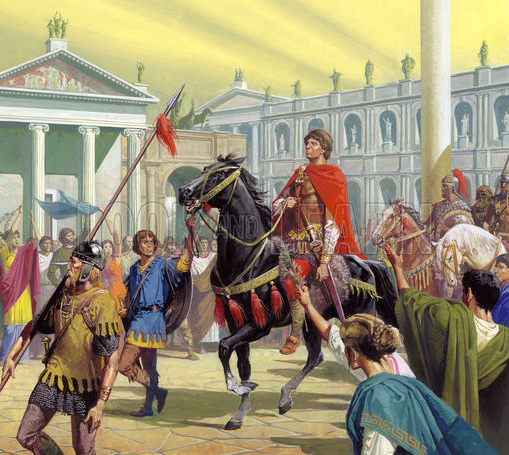
Theodoric
Brought up as a hostage in the court of Byzantium, he learnt to know the advantages of an orderly and cultivated society and the principles by which it must be maintained; called in early manhood to roam as a warrior-chief over the plains of the Danube, he acquired along with the arts of command a sense of the superiority of his own people in valour and energy and truth. When the defeat and death of Odoacer had left the peninsula at his mercy, he sought no further conquest, easy as it would have been to tear away new provinces from the Eastern realm, but strove only to preserve and strengthen the ancient polity of Rome, to breathe into her decaying institutions the spirit of a fresh life, and without endangering the military supremacy of his own Goths, to conciliate by indulgence and gradually raise to the level of their masters the degenerate population of Italy. The Gothic nation appears from the first less cruel in war and more prudent in council than any of their Germanic brethren: all that was most noble among them shone forth now in the rule of the greatest of the Amali. From his palace at Verona, commemorated in the song of the Nibelungs, he issued equal laws for Roman and Goth, and bade the intruder, if he must occupy part of the lands, at least respect the goods and the person of his fellow-subject. Jurisprudence and administration remained in native hands: two annual consuls, one named by Theodoric, the other by the Eastern monarch, presented an image of the ancient state; and while agriculture and the arts revived in the provinces, Rome herself celebrated the visits of a master who provided for the wants of her people and preserved with care the monuments of her former splendour. With peace and plenty men’s minds took hope, and the study of letters revived. The last gleam of classical literature gilds the reign of the barbarian. By the consolidation of the two races under one wise government, Italy might have been spared six hundred years of gloom and degradation. It was not so to be. Theodoric was tolerant, but toleration was itself a crime in the eyes of his orthodox subjects: the Arian Goths were and remained strangers and enemies among the Catholic Italians.
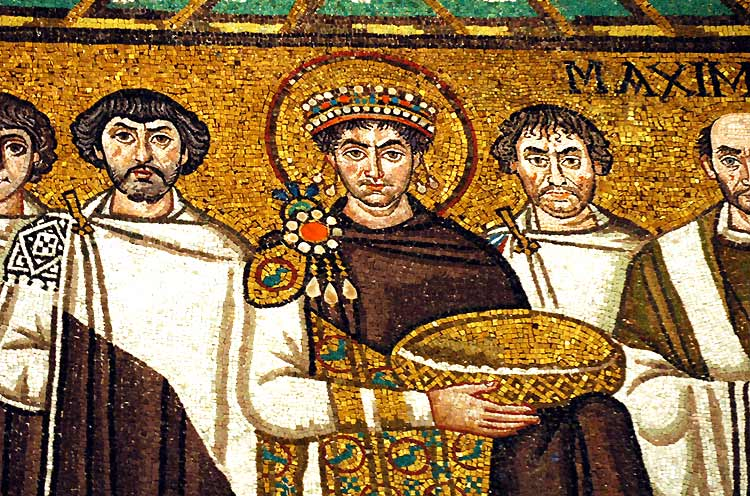
Italy reconquered, by Justinian
Scarcely had the sceptre passed from the hands of Theodoric to his unworthy offspring, when Justinian, who had viewed with jealousy the greatness of his nominal lieutenant, determined to assert his dormant rights over Italy; its people welcomed Belisarius as a deliverer, and in the struggle that followed the race and name of the Ostrogoths perished for ever. Thus again reunited in fact, as it had been all the while united in name, to the Roman Empire, the peninsula was divided into counties and dukedoms, and obeyed the exarch of Ravenna, viceroy of the Byzantine court, till the arrival of the Lombards in A.D. 568 drove him from some districts, and left him only a feeble authority in the rest.
The Transalpine provinces
Beyond the Alps, though the Roman population had now ceased to seek help from the Eastern court, the Empire’s rights still subsisted in theory, and were never legally extinguished. As has been said, they were admitted by the conquerors themselves: by Athaulf, when he reigned in Aquitaine as the vicar of Honorius, and recovered Spain from the Suevi to restore it to its ancient masters; by the Visigothic kings of Spain, when they permitted the Mediterranean cities to send tribute to Byzantium; by Clovis, when, after the representatives of the old government, Syagrius and the Armorican cities, had been overpowered or absorbed, he received with delight from the Eastern emperor Anastasius the grant of a Roman dignity to confirm his possession. Arrayed like a Fabius or Valerius in the consul’s embroidered robe, the Sicambrian chieftain rode through the streets of Tours, while the shout of the provincials hailed him Augustus. They already obeyed him, but his power was now legalised in their eyes, and it was not without a melancholy pride that they saw the terrible conqueror himself yield to the spell of the Roman name, and do homage to the enduring majesty of their legitimate sovereign.
Lingering influences of Rome
Yet the severed limbs of the Empire forgot by degrees their original unity. As in the breaking up of the old society, which we trace from the sixth to the eighth century, rudeness and ignorance grew apace, as language and manners were changed by the infiltration of Teutonic settlers, as men’s thoughts and hopes and interests were narrowed by isolation from their fellows, as the organization of the Roman province and the Germanic tribe alike dissolved into a chaos whence the new order began to shape itself, dimly and doubtfully as yet, the memory of the old Empire, its symmetry, its sway, its civilization, must needs wane and fade. It might have perished altogether but for the two enduring witnesses Rome had left—her Church and her Law.
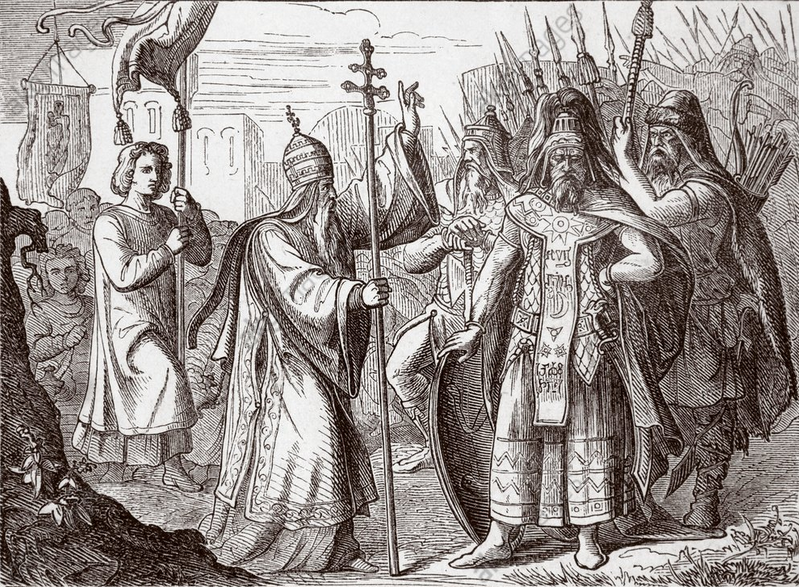
Religion
The barbarians had at first associated Christianity with the Romans from whom they learned it: the Romans had used it as their only bulwark against oppression. The hierarchy were the natural leaders of the people, and the necessary councillors of the king. Their power grew with the extinction of civil government and the spread of superstition; and when the Frank found it too valuable to be abandoned to the vanquished people, he insensibly acquired the feelings and policy of the order he entered.
As the Empire fell to pieces, and the new kingdoms which the conquerors had founded themselves began to dissolve, the Church clung more closely to her unity of faith and discipline, the common bond of all Christian men. That unity must have a centre, that centre was Rome. A succession of able and zealous pontiffs extended her influence (the sanctity and the writings of Gregory the Great were famous through all the West): never occupied by barbarians, she retained her peculiar character and customs, and laid the foundations of a power over men’s souls more durable than that which she had lost over their bodies.
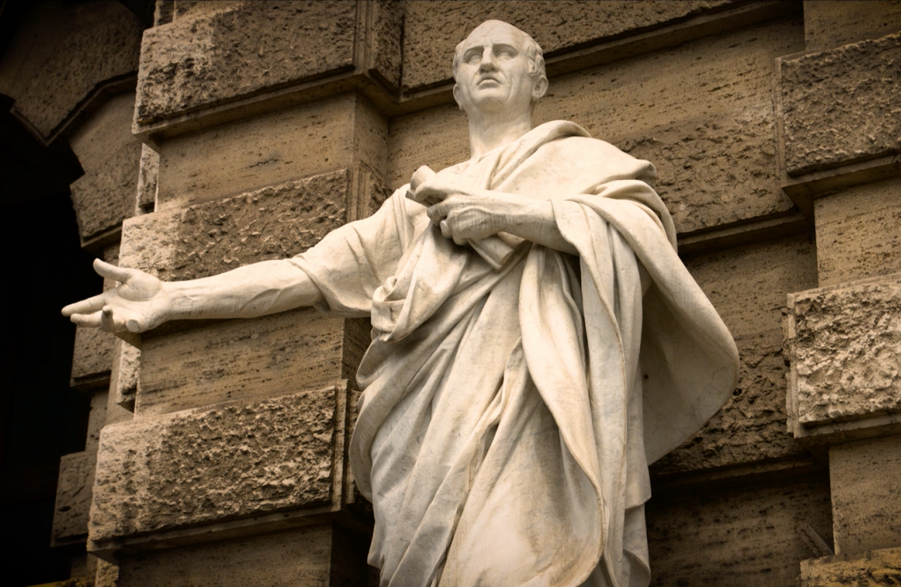
Jurisprudence
Only second in importance to this influence was that which was exercised by the permanence of the old law, and of its creature the municipality. The barbarian invaders retained the customs of their ancestors, characteristic memorials of a rude people, as we see them in the Salic law or in the ordinances of Ina and Alfred. But the subject population and the clergy continued to be governed by that elaborate system which the genius and labour of many generations had raised to be the most lasting monument of Roman greatness.
The civil law had maintained itself in Spain and Southern Gaul, nor was it utterly forgotten even in the North, in Britain, on the borders of Germany. Revised editions of the Theodosian code were issued by the Visigothic and Burgundian princes. For some centuries it was the patrimony of the subject population everywhere, and in Aquitaine and Italy has outlived feudalism. The presumption in later times was that all men were to be judged by it who could not be proved to be subject to some other. Its phrases, its forms, its courts, its subtlety and precision, all recalled the strong and refined society which had produced it. Other motives, as well as those of kindness to their subjects, made the new kings favour it; for it exalted their prerogative, and the submission enjoined by it on one class of their subjects soon came to be demanded from the other, by their own laws the equals of the prince. Considering attentively how many of the old institutions continued to subsist, and studying the feelings of that time, as they are faintly preserved in its scanty records, it seems hardly too much to say that in the eighth century the Roman Empire still existed in the West: existed in men’s minds as a power weakened, delegated, suspended, but not destroyed.
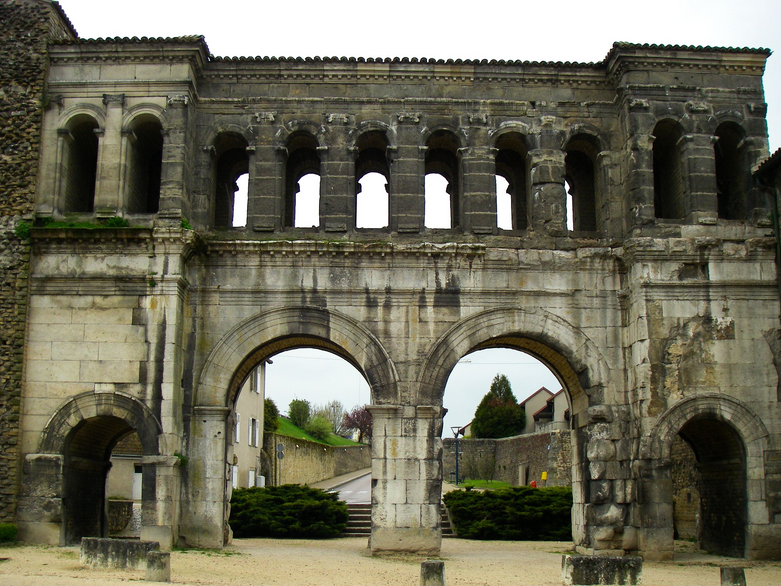
It is easy for those who read the history of an age in the light of those that followed it, to perceive that in this men erred; that the tendency of events was wholly different; that society had entered on a new phase, wherein every change did more to localize authority and strengthen the aristocratic principle at the expense of the despotic. We can see that other forms of life, more full of promise for the distant future, had already begun to shew themselves: they—with no type of power or beauty, but that which had filled the imagination of their forefathers, and now loomed on them grander than ever through the mist of centuries—mistook, as it has been said of Rienzi in later days, memories for hopes, and sighed only for the renewal of its strength. Events were at hand by which these hopes seemed destined to be gratified.

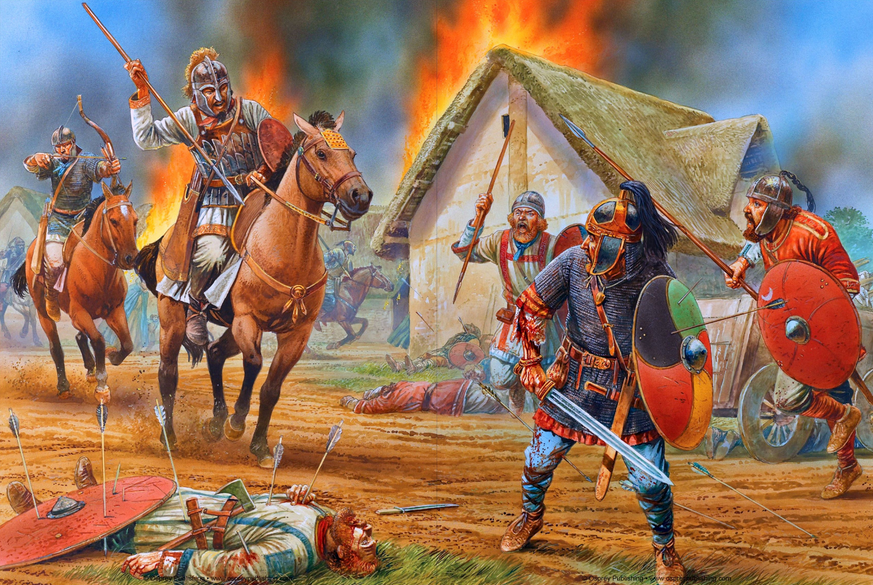


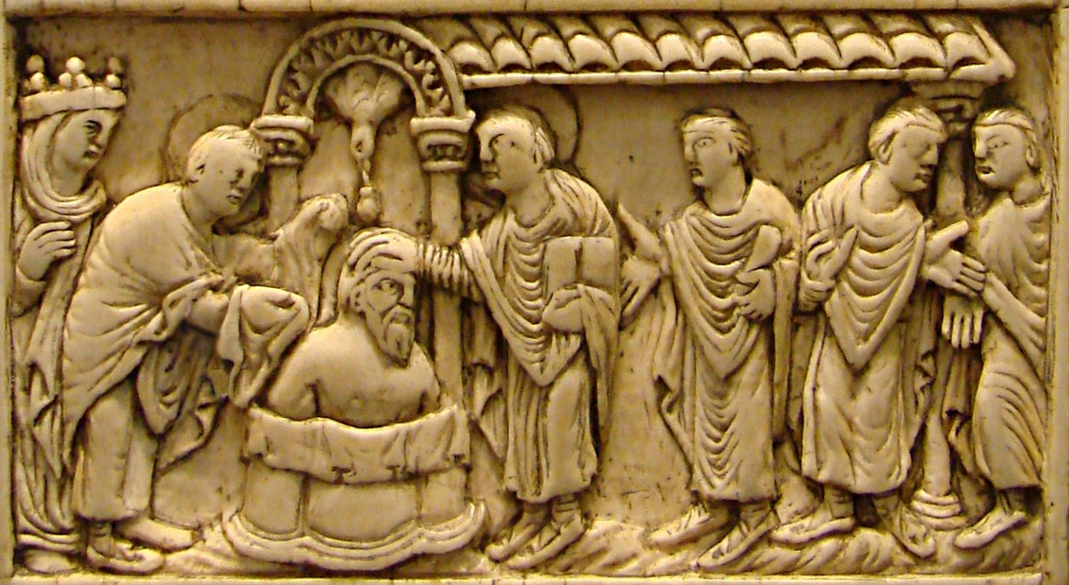





4.5